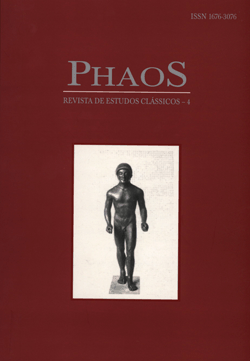Os gêneros poéticos antigos e o lugar-específico nas poéticas de Aristóteles e Horácio
Keywords:
Poetic gemes. Poetics. Tópoi ídioi. Tópoi koinoí. Rhetoric. Imitation.Abstract
Considering the distinction between tópos koinós and tópos ídios made by Aristotle in the Art of rhetoric, as well as the existence of a series of tópoi koinoí that the poets dealt with in the composition of their poems, in this essay we examine what are and what could be, in Poetics, the correspondent tópoi ídioi, and why they seem not to have been studied further. Two major texts are mentioned, Aristotle's and Horace's Poetics, and an outstanding modern essay, once more Francis Cairn's Generic composition in Greek and Latin poetry. We show that Cairns at least mentioned the issue, and we try to show that, though not explicitly, both Aristotle and Horace, but mainly the latter, convey the existence of tópoi ídioi, and relate them to the very essence of each poetic geme, such as epic, elegiac, iambic, and Iyric poetryReferences
CAIRNS, Francis. Generic composition in Greek and Roman poetry. Edinburg, 1972.
CONTE, Gian Biagio. "Genre between empiricism and theory". In: Genres and readers: Lucretius, Lave elegy, Pliny's Encyclopedia. Baltimore and London: The Johns Hopkins University Press, 1994, p. 105-28.
CURTIUS, Ernst Robert. Literatura européia e Idade Média latina. São Paulo: Edusp/ Hucitec, 1996.
SANTOS, Marcos Martinho. "O monstro da Arte poética de Horácio". Letras Clássicas 4. São Paulo: Humanitas, 2000, p. 191-265.
Downloads
Published
2012-11-29
Issue
Section
Artigos
License
When submitting papers to PhaoS, authors should be aware that PhaoS shall hold all relevant copyrights over such papers if they are accepted for publication. Manuscripts will not be returned.

